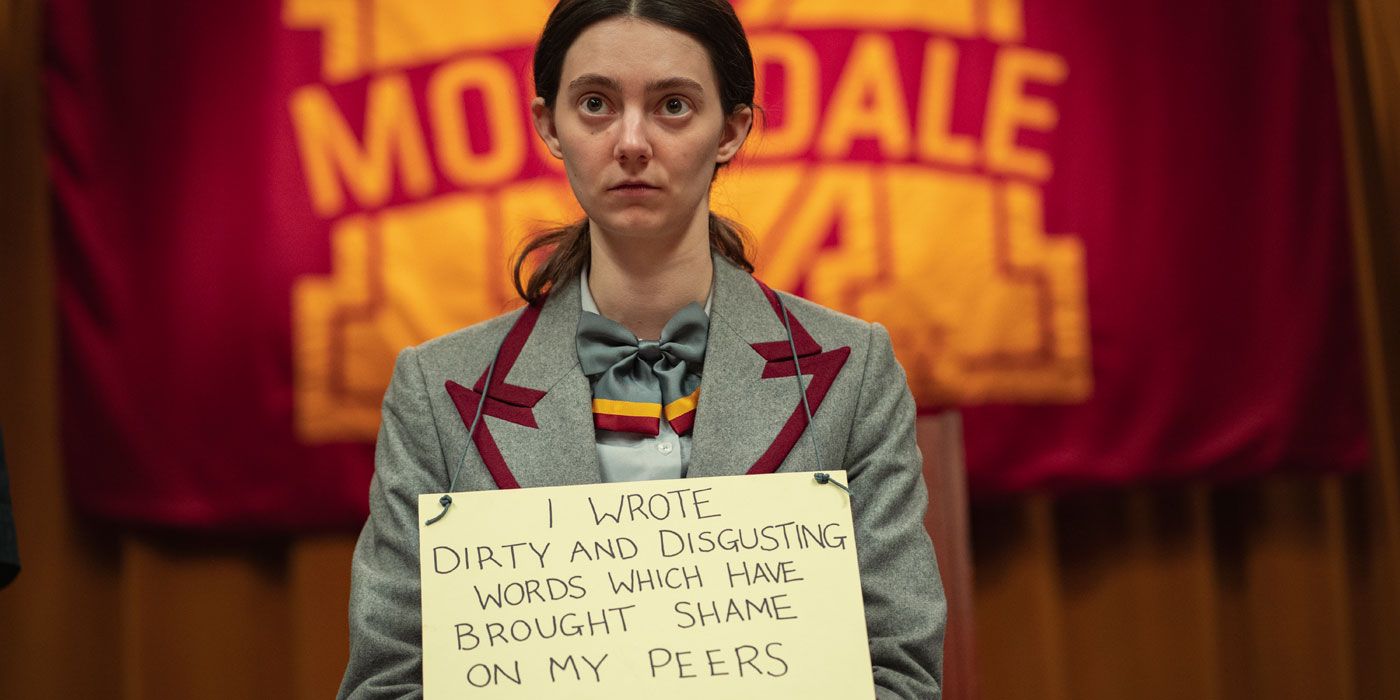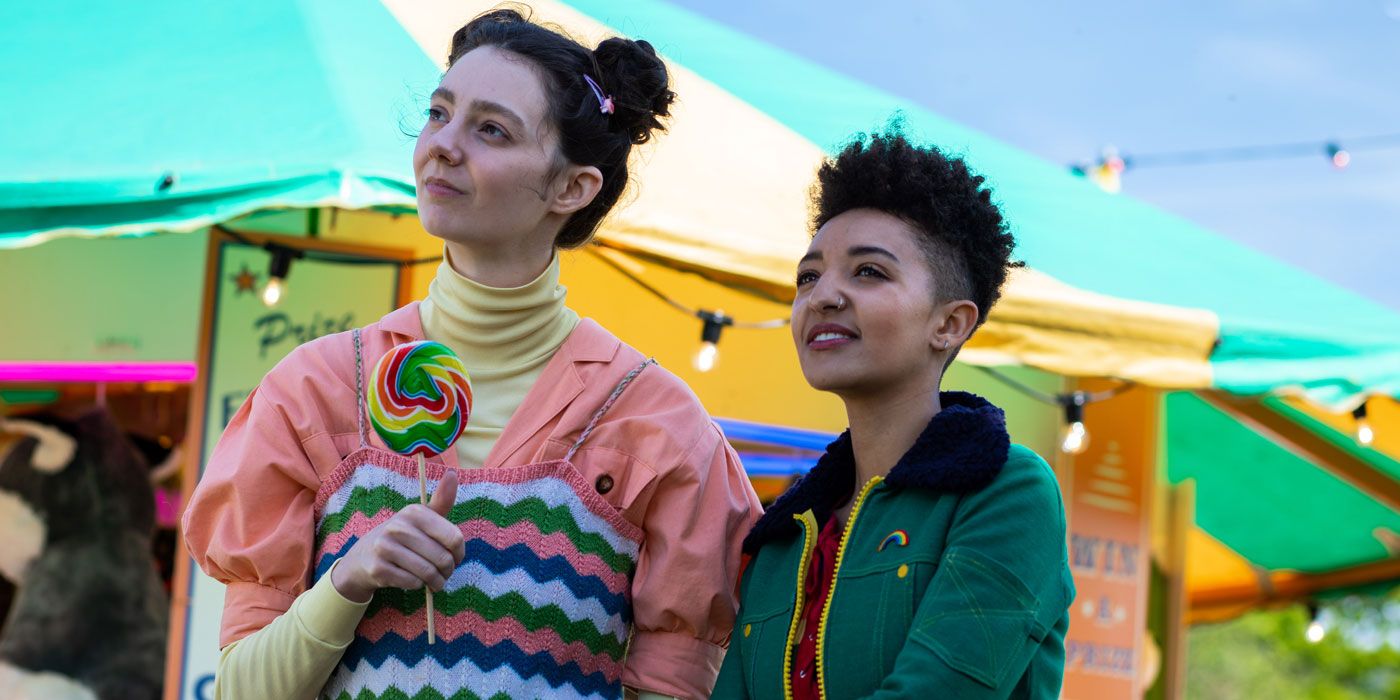Sex Education: Why Lily Is the Best Character
[Editor's note: The following contains spoilers through the Season 3 finale of Sex Education.]
Let's talk about what it's like to be seen as a joke. Which is to say, let's talk about Lily on Sex Education.
The Netflix dramedy, recently greenlit for a fourth season, examines the spectrum of sexual identity and behavior that exist at the fictional Moordale Academy, with the ensemble representing a wide range of individuals. But standing out amidst that ensemble has always been Lily, who, as played by Tanya Reynolds, is a clever and sci-fi-obsessed young writer whose interest in sex initially struggles to get past her own mental hangups.
It's thanks to characters like Lily that Sex Education earns its most common comparison point, as the show more often than not plays as a spiritual sex-positive successor to the generation-defining works of writer/director John Hughes. In the 1980s, Hughes became known for his ability to see, in stories about teenagers, a... well, certainly not diversity when it comes to race or sexual identity. But films like Sixteen Candles and The Breakfast Club endure because of how the ensembles feature a wide range of adolescent experiences and "types," while simultaneously breaking down artificial constructs like popularity and oddity to send the message that, awkward or confident, we all have so much in common.

From the beginning of the series, Lily stands out as a nonconformist who barely conceals her nerdy passions — as well as the way in which her love of sci-fi and fantasy are tangled up in her own blossoming sexuality. In Season 1, she volunteers to have sex with Otis (Asa Butterfield) in what proves to be a disastrous encounter, as neither is fully ready to go through with the act, and Otis ends up having a panic attack. Later, Lily ends up connecting with OctoBoy (Kadeem Ramsay), but despite him being game for her love of roleplay, it takes Otis's help to talk her through her issues with vaginismus, helping her understand her own relationship with her body, and what she is and isn't ready for in reality.
Season 2 features Lily at her most triumphant, as she not only develops a solid relationship with Ola (Patricia Allison) but also stages perhaps the world's first stage adaptation of Romeo and Juliet to feature penis fingers. However, then comes Season 3, which spotlights the character's passion for her work in a much darker and sadder fashion. Having become a target of new headteacher Hope (Jemima Kirke) thanks to her theatrical achievements and on-brand eccentricities, Lily is forced to swap her signature hair buns and wild makeup for a sedate ponytail and plain face. Plus, when her latest work of erotic fiction is published by the local newspaper to spotlight yet another act of depravity from the now notorious "Sex School," Hope subjects her to a full-on public shaming, complete with a sign singling her out as a source of embarrassment for her fellow students.
Watching Lily descend fully into bland conformity, for the brief period of time it lasts, is one of the more emotionally brutal storylines of Season 3, especially when her dedication to being herself is dealt a fatal blow. Lily being ridiculed for her beliefs (or, more importantly, being ridiculed for expressing them so openly) is nothing new for the character or the show; the wound that really stings her is when Ola tells her that she doesn't believe in aliens — while Lily has mastered being independent, it's in that moment we see just how much Ola's support (and their bond) has meant to her.
Episode 7 features Lily at her lowest, even while the student takeover of their Open Day presentation includes a lovely mention of support from Head Girl Vivienne (Chinenye Ezeudu):
If Lily Iglehart is a weirdo for writing short stories about aliens with penis hands, we're definitely weirdos too.
Not even a lovely pep talk from Otis immediately pulls her out of that funk, though his words clearly resonate with her. Lily's return to her special brand of normal in the season finale is a bit rushed, especially given the emotional blow that is watching her strip herself of all her individuality. But it's still a joy to see her back in full alien lover mode, gazing up at the sky with hope that something more lies beyond.

Let's look back at that pep talk from Otis, in Episode 7, when he tells her that while she might be used to being considered strange, in some ways she's anything but:
It's really common for people to create rich fantasy worlds to escape into. It's what most artists do. They are brave enough to show the weirdest, most vulnerable sides of themselves in their work. Which helps a lot of people not feel as alone.
It's the essence of how storytelling like this can matter so much. The writing of Lily as a character has always included a degree of self-awareness, the kind of self-conscious forcefield you can't help but put up around yourself, once you've accepted the fact that you'll never quite fit in with the other kids at school. You know you don't fit in, but you can't be anyone else but yourself, so you have no choice but to just roll with it. (It might be a feeling you can still recognize and relate to, decades after graduation, while doing your job writing about television.)
It's exactly the sort of story at which Sex Education excels: A person feels like they're a joke, and then learns that they don't deserve ridicule — they deserve acceptance. Lily might be the most out-there member of the Moordale Academy student body. But as much as it might pain her to hear it, she's far from alien.
Sex Education Seasons 1-3 are streaming now on Netflix.


التعليقات على الموضوع